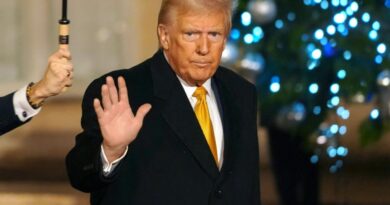Interference in the Election: Live from New York

Throughout the past few months, the election’s path has been evident.
It all boils down to swing states. In more direct terms, the late-deciding, low-information voters in those states whose political beliefs are as fickle as palm fronds swaying in a tropical breeze.
If the goal is to reach those voters, who are immersed in pop culture and respond to vibes rather than their financial situations, the best place to do so is on the least intelligent comedy show on TV.
In this sense, the meeting of form and function happened with Kamala Harris’s appearance on “Saturday Night Live”, which may be her most impactful campaign ad of this cycle, only necessitating a flight diversion to New York for the sketch.
It’s no secret that “SNL” leans politically. Remember back in 2016 when Kate McKinnon did a stirring rendition of Leonard Cohen’s “Hallelujah” as a glorified version of Hillary Clinton.
Years later, former cast member Rob Schneider expressed his disappointment: “I prayed, ‘Please have a joke at the end. Don’t do this. Please don’t go down there.’ And there was no joke at the end, and I went, ‘It’s over. It’s over. It’s not going to come back.’”
However, that’s where Schneider was mistaken. The show evolved into a platform for concerned liberals and their political beliefs.
This past Saturday night underscored that sentiment, with Donald Trump being parodied before Maya Rudolph’s Harris engaged in cringeworthy interactions with the genuine article.
“Keep Kamala and Carry-on-a-La”? “Kamala, take my palmala”? “The American people want to end the drama-la”??
The cheesy jokes about the impersonator and the real deal and their “belief in the promise of America” failed as authentic comedy. But that wasn’t the goal.
Another beneficial aspect of the intro skit for the vice president: It allowed her to make up for missing the Al Smith Dinner and provided her with a bigger audience than those just watching cable news coverage of the event.
What’s the significance of this contribution, which clearly didn’t offer Trump equal exposure, sidestepping concerns raised by “SNL” creator Lorne Michaels regarding election laws and equal time provisions?
Federal Communications Commissioner Brendan Carr is correct in condemning the Harris appearance as a clear attempt to circumvent the FCC’s Equal Time rule.
“The purpose of the rule is to avoid exactly this type of biased and partisan conduct — a licensed broadcaster using the public airwaves to exert its influence for one candidate on the eve of an election,” Carr states.
While there isn’t much that can be done at this point, early voting has concluded in many parts of the country.
But Tuesday’s Election Day vote is crucial, and Dems got all the “SNL” sauce.
There will be SNL-influenced voters — the question is how many.
In swing state polls, margins are razor-thin. Fractions of a percentage point make all the difference, representing a handful of voters in key states like Arizona, Nevada, Georgia, and North Carolina.
In most scenarios, a candidate doesn’t need a significant boost. A small one will suffice.
NBC, “SNL,” and all the actors involved in that sketch provided just that, effectively meddling in the election and disregarding rules and conventions that were upheld in the past.
While the show has lost its comedic edge and relevance to the current culture, it still holds political clout.
This weekend, it bet heavily on the Democratic ticket.
If Trump loses on Tuesday, could the blame lie on sketch comedy crossing lines?



